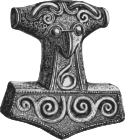- Laufey
-
Laufey or Nál is a figure from Norse mythology, the mother of Loki. Eddic poetry refers to Loki by the matronym Loki Laufeyjarson rather than with a patronymic.[1][2]
According to the Prose Edda, Loki is Laufey's or Nál's son by the giant Fárbauti, and has the brothers Býleistr and Helblindi:
Sá er nefndr Loki eða Loptr, sonr Fárbauta jötuns; móðir hans er Laufey eða Nál; bræðr hans eru þeir Býleistr ok Helblindi. He is called Loki or Loptr, son of the jötunn Fárbauti; his mother is Laufey or Nál; his brothers they are Býleistr and Helblindi.[3]
Nál means "needle"; according to Sörla þáttr, Laufey was also called this because she was "both slender and weak".[4][5] The meaning of Laufey is less clear but is generally taken to be "full of leaves";[1][6] as Fárbauti means "dangerous hitter," there is a possible nature mythological interpretation with lightning hitting the leaves or needles of a tree to give rise to fire.[7][8]
In popular culture
Laufey is depicted as a male character in the Marvel Comics universe, the King of the Frost Giants and father of Loki, the archenemy of the superhero Thor. In the 2011 film adaptation, Laufey is portrayed by Canadian actor Colm Feore.
References
- ^ a b Rudolf Simek, Dictionary of Northern Mythology, tr. Angela Hall, Cambridge: Brewer, 1993, repr. 2000, ISBN 0-85991-513-1, pp. 186-87. Simek uses the spellings Nal and Farbauti.
- ^ John Lindow, Norse Mythology: A Guide to the Gods, Heroes, Rituals, and Beliefs, Santa Barbara, California: ABC-Clio, 2001, repr. Oxford University Press, 2002, ISBN 0-19-515382-0, p. 207.
- ^ Gylfaginning 33; the kennings for Loki in Skáldskaparmál 16 include the same information: son Fárbauta ok Laufeyjar, Nálar, bróður Býleists ok Helblinda - "son of Fárbauti and Laufey (Nál), brother of Býleist and Helblindi."
- ^ bæði mjó ok auðþreiflig, ed. Carl Christian Rafn, Fornaldar Sögur Norðrlanda Volume 1, Copenhagen, 1829, p. 392.
- ^ Lindow, p. 235.
- ^ Jan de Vries, Altgermanische Religionsgeschichte volume 2, 2nd ed. Berlin: de Gruyter, 1957, repr. 1970, p. 263, note 1 (German) indicates that Hugo Gering interpreted Laufey as "member of a distinguished clan" and Nál as "killer."
- ^ Axel Kock, "Etymologisch-mythologische Untersuchungen," Indogermanische Forschungen 10 (1899) 90-111; summary in Jahresbericht über die Erscheinungen auf dem Gebiete der germanischen Philologie 21 (1899) p. 37 (German)
- ^ Simek, p. 78; but Simek, p. 227 doubts Nál is the same person as Laufey and considers relating the latter name to death, as in Naglfar.
Norse paganism Deities,
heroes,
and figuresOthersAsk and Embla · Dís (Norns · Valkyries) · Dwarf · Einherjar · Elves (Light elves · Dark elves) · Fenrir · Hel · Jörmungandr · Jötunn · Sigurd · Völundr · Vættir
Locations Asgard · Bifröst · Fólkvangr · Ginnungagap · Hel · Jötunheimr · Midgard · Múspellsheimr · Niflheim · Valhalla · Vígríðr · Wells (Mímisbrunnr · Hvergelmir · Urðarbrunnr) · YggdrasilEvents Sources Society See also Categories:- Minor characters in Norse mythology
- Jötnar
Wikimedia Foundation. 2010.
